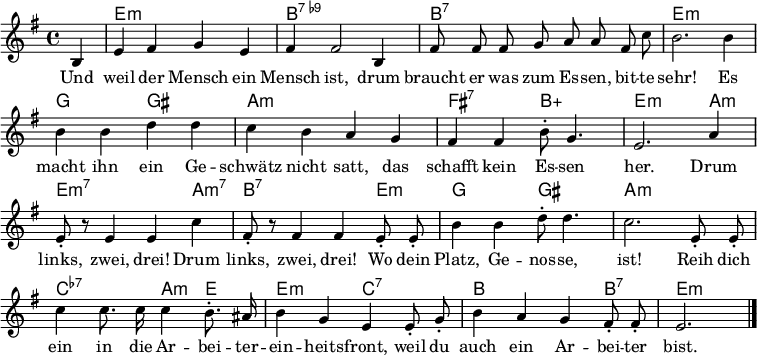Einheitsfrontlied
| "Einheitsfrontlied" | |
|---|---|
 | |
| Song | |
| Written | Bertolt Brecht |
| Published | 1934 |
| Composer(s) | Hanns Eisler |
The "Einheitsfrontlied", translated as the "United Front Song" in English, is one of the most famous songs of the German labour movement. It was written by Bertolt Brecht and composed by Hanns Eisler. The best-known rendition was sung by Ernst Busch.
History
[edit]After Adolf Hitler's coming to power in January 1933, the situation for left-wing movements in Germany drastically deteriorated. The antagonism between the Social Democratic Party and the Communist Party had long divided the German left. After the Nazis banned both parties and labour unions in the summer of 1933, many people, including Bertolt Brecht, believed that only a united front of social democrats and communists could fight back against the National Socialists. In 1934, at the request of fellow theatre director Erwin Piscator, Brecht wrote the "Einheitsfrontlied", calling for all workers to join the Arbeiter-Einheitsfront, the Workers' United Front. The song was performed the next year in the First International Workers Music Olympiad held in Strasbourg by a choir of 3,000 workers. Its first record was printed in 1937, during the Spanish Civil War, performed by communist actor and singer Ernst Busch.[1] It was later published in Brecht's 1939 collection Svendborger Gedichte.[2]
Composition
[edit]Hanns Eisler, who would later go on to compose the East German national anthem "Auferstanden aus Ruinen", intentionally kept the composition of "Einheitsfrontlied" simple and easy to follow, so it could be sung by workers without much musical training.[3] In doing so, the song is quite march-like. In 1948, Eisler wrote a symphonic version, which was also sung by Ernst Busch and recorded for his Aurora-Projekt.
Cover versions
[edit]Ton Steine Scherben covered the song on their 1971 album Warum geht es mir so dreckig?. Hannes Wader recorded the song on his 1977 album Hannes Wader singt Arbeiterlieder.
Lyrics
[edit]| German original[4] | Cyrillization of German | English version[5] | Russian version[6][7] |
|---|---|---|---|
Und weil der Mensch ein Mensch ist, |
Унд вайл дер менш айн менш ист, |
And just because he's a human, |
И так как все мы люди, |
Music
[edit]
See also
[edit]References
[edit]- ^ Bertolt Brecht (1997), Ausgewählte Werke in 6 Bänden (in German), vol. 3, Suhrkamp, p. 472
- ^ Bertolt Brecht, Poems 1913–1956, ed. by John Willett, Ralph Manheim, and Erich Fried (London: Eyre Methuen, 1976), p. 507.
- ^ Hirschfeld, Eugene (31 July 2010). "United Front Song (Einheitsfrontlied)". Marxist Theory of Art. Blogger. Retrieved 5 September 2017.
- ^ "Lyrics: Die Einheitsfront". www.marxists.org. Retrieved 2017-11-30.
- ^ Songbook (PDF) of the International Brigades
- ^ Перевод С. Болотина и Т. Сикорской (около 1935)
- ^ ПЕСНЯ ЕДИНОГО ФРОНТА AGITCLUB.
External links
[edit]- Lied der Einheitsfront (1937) on YouTube (sung by Ernst Busch in Spanish, English, French and German)
- Song of the United Front on YouTube (International Brigades translation)
